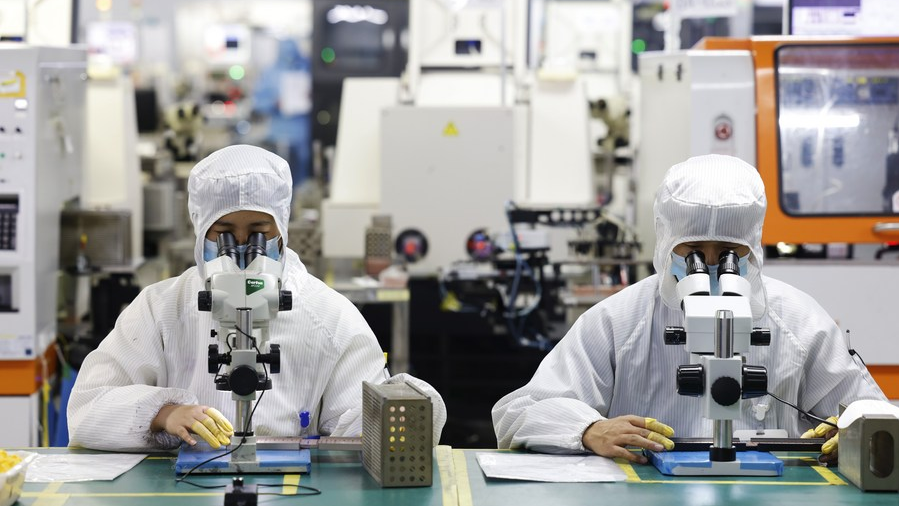By Huang Yongfu
On August 9, U.S. President Joe Biden signed into law the Chips and Science Act of 2022, which authorizes state subsidies of $52.7 billion to boost chip manufacturing and research and funds about $170 billion for space exploration, innovation and scientific research over the next decade.
The bill is set to reduce the U.S. reliance on foreign suppliers for chips by revitalizing domestic manufacturing, while the U.S. industrial policy is suppressing Chinese semi-conductor development, while blocking China out of advanced chip-making and decouple chip-making industries between China and the West.
Repurposed industrial policy to gut China's chip-making ecosystem
Chips are as critical as missiles for today's war-fighting in driving nearly all aspects of modern technologies from cars, computers, medical devices, to engines and weapons systems.
The Biden administration says that the legislation is a "national security imperative" to address a major national security concern: Expanding Chinese technical dominance in the field of chip-making has posed a threat to U.S. economic security.
The bill forbids recipients of federal subsidies from cooperating with Beijing, including construction or expansion of advanced semiconductor-manufacturing plants in China or other potentially unfriendly countries.
Previously, the U.S. tightened export controls on chip-making equipment and technology going to China. In December 2020 the U.S. placed SMIC, China's leading chip-maker, on an export blacklist to which a license is required for any American company wishing to export equipment, particularly from the trio of American toolmakers inclusive of Applied Materials, KLA and Lam Research dominating a different step of the process, respectively.

Workers make chips for export at an electronics company in Sihong, east China's Jiangsu Province, February 23, 2022. [Photo/Xinhua]
Latest example of state interventionism to attack geopolitical rivals
Although against the doctrine of liberal capitalism, industrial policy has been one of the most important and oldest state interventionist tools to support favored industries, technologies or specific firms.
After the stagflation of the late 1970s, national economies were liberalized and globalization has knitted together world markets. With the less-state-is-better consensus, the state in the West largely acted as an umpire to oversee the rules for firms to compete in a global market, while private firms were allowed to follow commercial logic. Industrial policy has been discredited for "distorting investment" and "using government policy to manipulate the market" during a long liberalizing era.
After the financial crisis of 2007-09, markets alone cannot deliver for ordinary people equally or avert climate change. The state has bounced back and industrial policy has been adopted to promote job creation, income equality and energy transition.
After the Brexit and election of Donald Trump in 2016 when Washington has been replete with a group of increasingly fickle, "visionary" progressives or national-security hawks, the words "industrial policy," once taboo, reverberate in the White House, Congress and think tanks. Nonetheless, industrial policy has become politicized and weaponized, not only to support any favored industries but to attack geopolitical rivals.
To justify state intervention in business, national security hawks advocate the "China threat" to pit the so-called liberal democracies against China. The current geopolitical backdrop is a far cry from the Cold War when the West and the Soviet Union had few business links, by contrast nowadays the West and China are economically intertwined.
To cause damage to the Chinese economy, cut off Chinese supply chains from global supply chains or decouple the Chinese economy from the global economic system, national security hawks in the West prompted their governments to align business interests with national security goals and to meddle in corporate affairs via various industrial and trade policies such as tariffs, export controls, punitive sanctions and "friend-shoring."
Will Western politicians feel shame when accusing China of 'non-market trade practices and unfair competition?'
When countries like the U.S. introduced anti-competitive measures such as state subsidies to support strategic industries, other Western countries didn't sit back on the sidelines. Japan has offered around $500 million in subsidies for investment in industries ranging from cyber-security to chip-making at home. The EU has earmarked some 160 billion euro ($180 billion) of its COVID-19 recovery fund for digital innovations, especially chips. The "France 2030" program includes 30 billion euro over five years to support 10 areas including small nuclear reactors and medicines.
Yet the Biden administration often expresses "fundamental concerns with China's non-market trade practices and unfair competition." The latest example is the U.S. Treasury Secretary Janet Yellen made groundless anti-China allegations during her recent trip to the Republic of Korea that China is using "unfair trade practices" and its market position in key raw materials, technologies, or products to exercise "unwanted geopolitical leverage" and "gain a dominant position in certain industries."
In the annual trade policy agenda released in March 2022, the Office of the U.S. Trade Representative said, "We are clear-eyed about China's doubling down on its harmful trade and economic abuses," noting that "lack of protections for workers, a weak environmental regime, and anti-competitive subsidies are the hallmarks of China's artificial comparative advantage."
Can a cooler head prevail?
There is a case for state intervention to make markets work better, but the new style of bossy government with a warped sense of "national security interests" goes far beyond this, which is less likely to end up with prosperity, fairness and security but inefficiency, vested interests and insularity.
Milton Friedman is reputed to have said that the business of business is business. Business needs incentives to do the right thing, but the incentives rely on governments to spur dynamism and maintain openness.
Apparently, Washington is entering a political cycle with a group of increasingly opinionated, ideological, paranoid and hysterical politicians indulged in geopolitical rivalry, giving globalization and international cooperation the cold shoulder and losing faith in free markets and liberal capitalism.
Huang Yongfu is an economic affairs commentator. After earning a PhD, he started his career at the University of Cambridge and then moved on to the UN system. His current interests lie in global development and Sino-U.S. links.

 中文
中文



